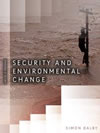Introducing
 Professor Simon Dalby obtained his Ph.D. (on cold war geopolitics) at Simon Fraser University.
Professor Simon Dalby obtained his Ph.D. (on cold war geopolitics) at Simon Fraser University.
He works at Carleton University in Ottawa, teaching courses in political geography, and is co-editor of the Geopolitics journal. Professor Dalby is specialised in critical geopolitics, environmental security and the geographical dimensions of global politics.
In this interview, Professor Dalby discusses the results of his research into the many aspects of security that spans more than 20 years. He talks about the Cold War, global warming, the ideas of Thomas Hobbes and John Locke, geographical imaginations, political discourses and so on. Professor Dalby concludes the interview with suggesting possible roles of geographers in improving global and local security conditions. This is part 2 of the interview. The other parts are:
Interview
Political discourses, threats and dichotomies
What are the similarities and differences between US political discourses on the USSR in the early 1980s and Al-Qaida early in the 21st century?
 There are a number of obvious parallels although of course the differences matter greatly.
There are a number of obvious parallels although of course the differences matter greatly.
First is simply the assumption that war and violence or the threat of them is how relations are to be handled; this is a confrontation in which force is the ultimate arbiter. Both were portrayed as existential threats in the sense that if these were not defeated then the US would not survive. Obviously in the sense of Al Qaeda this is absurd, but the necessity of a long struggle to defeat these opponents is key to both discourses.
Threats from communism and terrorism also invoke global themes in that they may arise anywhere; subversion or violent acts are potentially ubiquitous. Even the threats of nuclear danger were invoked in regard to Al Qaeda, although the USSR had many thousand nuclear weapons and the means to get them to American targets and Al Qaeda obviously hasn’t either.
Claims that both are evil empires, even if Al Qaeda only apparently aspires to construct a new Caliphate also parallel each other.
How do the discourses and practices regarding US security of the Bush-II government and the Obama government compare?
While there is obvious continuity between the two in terms of the practice of the war on the Pashtun regions of Asia, there is one very large discursive difference.
The Obama administration doesn’t claim to be involved in a long struggle to eliminate tyranny on earth. This was the logic of pre-emptive and regime change warfare that was key to the Bush doctrine.
The official policy documents really said these things and while people frequently dismissed them as rhetoric the logic of the strategy was quite clear; the world really was divided into them and us, with us or with the terrorists in Bush’s early statements. American lead economic ‘freedom’ had to be extended by force if necessary to remove tyrannical regimes and what were seen as breeding grounds of terrorism.
Obama has a much more nuanced view of things and a more realistic view of the utility of military force. His administration abandoned the rhetoric of the war on terror, and in the case of the new strategic doctrine in early 2012 is more concerned with some version of the military containment of China, bizarre though that is in present circumstances, than trying to use force to remake the global order in America’s image.
What impact will recent changes in the division of global wealth have on the popularity of traditional dichotomies such as ‘the West’ and ‘the Rest’? Do you expect new dichotomies to rise to prominence? Could dichotomies lose their dominant position in geopolitical imaginations to more sophisticated categorizations? Is it possible that the ‘processes of othering’ will change?
The new dichotomies are potentially ones with very different geographies.
Its clear that the Occupy Wall Street protests have made many people more aware of the extraordinary polarisation of wealth in many places. The ‘1%’ are obviously wealthy Wall Street operators, the global elites, those who get invited to Davos for the annual meetings there, are not now so easily identified as only Americans or Westerners.
The poverty in many parts of the US in the aftermath of the so called financial crisis has now practically stopped much of the Latin American migration into the US, much more effectively it should be noted than all the fence building and inappropriate use of homeland security strategies to tackle immigration.
Asian elites are now extremely wealthy, while as elsewhere the marginal and poor parts of their nation states also struggle to exist. But there isn’t so obvious a geography as there perhaps used to be a generation ago, no matter how much the rhetoric in Washington tries to construct a new containment strategy against a rising China.
But what kind of economies Asia will produce in the next generation and how economic policies will change in the face of global environmental challenges and further global integration remains an open question.
